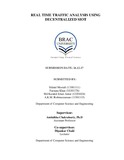| dc.contributor.advisor | Chakrabarty, Amitabha | |
| dc.contributor.author | Mostafi, Sifatul | |
| dc.contributor.author | Khan, Farzana | |
| dc.contributor.author | Antar, Md Kamrul Islam | |
| dc.contributor.author | Robinuzzaman, A.K.M. | |
| dc.date.accessioned | 2018-02-20T05:37:17Z | |
| dc.date.available | 2018-02-20T05:37:17Z | |
| dc.date.copyright | 2017 | |
| dc.date.issued | 12/26/2017 | |
| dc.identifier.other | ID 13301111 | |
| dc.identifier.other | ID 14101176 | |
| dc.identifier.other | ID 12201024 | |
| dc.identifier.other | ID 13301115 | |
| dc.identifier.uri | http://hdl.handle.net/10361/9518 | |
| dc.description | Cataloged from PDF version of thesis report. | |
| dc.description | Includes bibliographical references (pages 76-78). | |
| dc.description | This thesis report is submitted in partial fulfilment of the requirements for the degree of Bachelor of Science in Computer Science and Engineering, 2017. | en_US |
| dc.description.abstract | The traffic is growing exponentially and expected to be more congested by thousands of millions of vehicles in near future and will become an inescapable problem across the world. It will certainly be troublesome to communicate, navigate and finding desired services within this huge and congested traffic domain. It is highly necessary to find best routes in the congested traffic domain in order to minimize the hours wasted on the streets. Existing centralized system to maintain this traffic domain will minimize the outcome in terms of cost, time and scalability issue. By integrating social networking concepts into Internet of Things a new paradigm has been proposed named Social Internet of Things (SIoT). In this paper, the main focus is to design an efficient, dynamic and reliable decentralized system that integrates Social Internet of Things (SIoT) concept in the traffic domain in a distributive manner by assuming each vehicle as an IoT device. Unlike humans, vehicles will be guided artificially to create its very own society with various relationships within the network. The underneath concept is that every vehicle will communicate with other vehicles using it’s friendship in a decentralized manner, with only local information. In the network of smart IoT devices, by performing experiments on network properties and analyzing the result traffic congestion has been predicted. | en_US |
| dc.description.statementofresponsibility | Sifatul Mostafi | |
| dc.description.statementofresponsibility | Farzana Khan | |
| dc.description.statementofresponsibility | Md Kamrul Islam Antar | |
| dc.description.statementofresponsibility | A.K.M. Robinuzzaman | |
| dc.format.extent | 78 pages | |
| dc.language.iso | en | en_US |
| dc.publisher | BRAC University | en_US |
| dc.rights | BRAC University thesis reports are protected by copyright. They may be viewed from this source for any purpose, but reproduction or distribution in any format is prohibited without written permission. | |
| dc.subject | IoT device | en_US |
| dc.subject | Social Internet of Things (SIoT) | en_US |
| dc.subject | Traffic analysis | en_US |
| dc.subject | Centralized | en_US |
| dc.subject | Decentralized | en_US |
| dc.title | Real time traffic analysis using decentralized SIOT | en_US |
| dc.type | Thesis | en_US |
| dc.contributor.department | Department of Computer Science and Engineering, BRAC University | |
| dc.description.degree | B. Computer Science and Engineering | |

